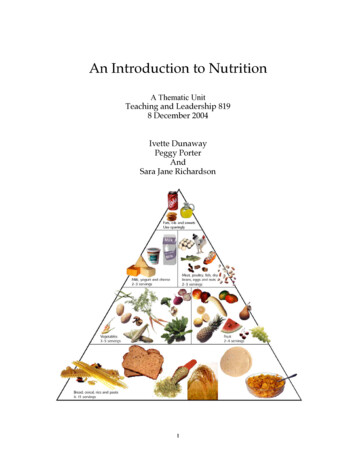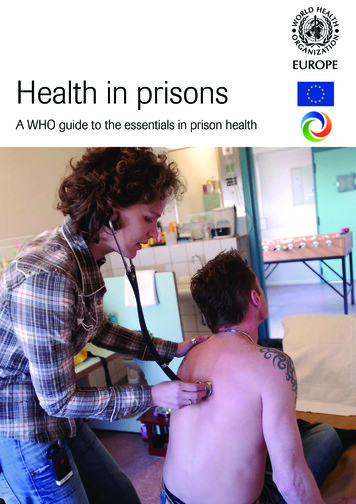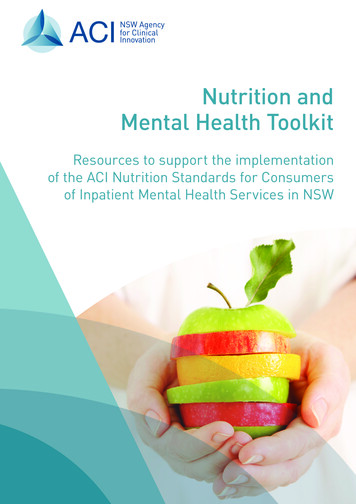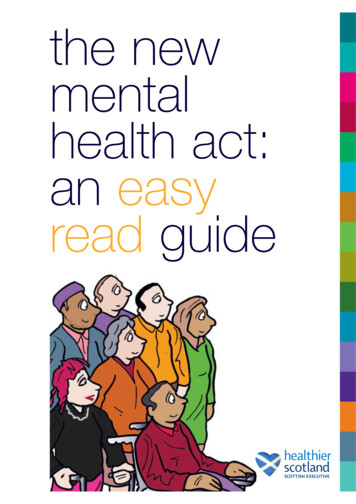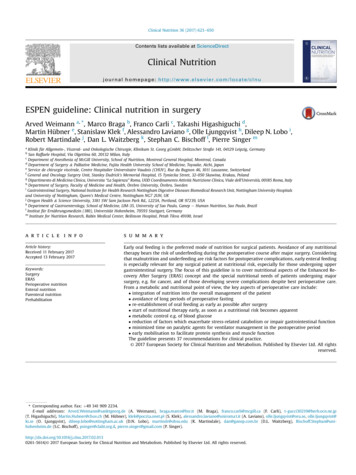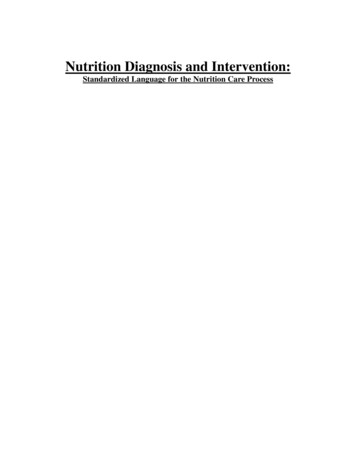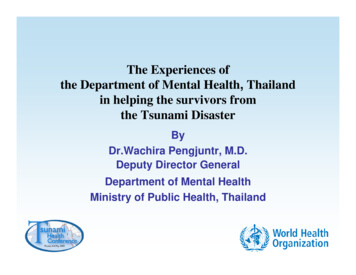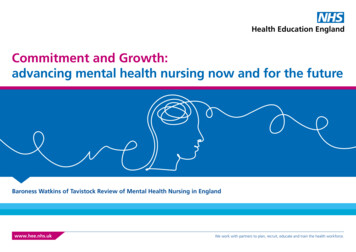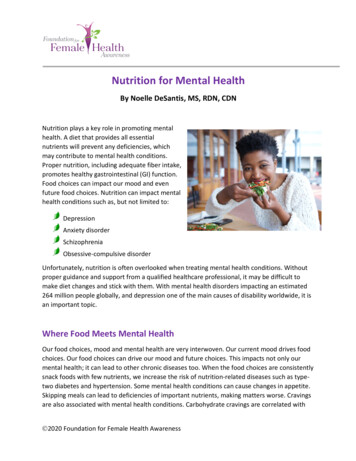
Transcription
Nutrition for Mental HealthBy Noelle DeSantis, MS, RDN, CDNNutrition plays a key role in promoting mentalhealth. A diet that provides all essentialnutrients will prevent any deficiencies, whichmay contribute to mental health conditions.Proper nutrition, including adequate fiber intake,promotes healthy gastrointestinal (GI) function.Food choices can impact our mood and evenfuture food choices. Nutrition can impact mentalhealth conditions such as, but not limited to:DepressionAnxiety disorderSchizophreniaObsessive-compulsive disorderUnfortunately, nutrition is often overlooked when treating mental health conditions. Withoutproper guidance and support from a qualified healthcare professional, it may be difficult tomake diet changes and stick with them. With mental health disorders impacting an estimated264 million people globally, and depression one of the main causes of disability worldwide, it isan important topic.Where Food Meets Mental HealthOur food choices, mood and mental health are very interwoven. Our current mood drives foodchoices. Our food choices can drive our mood and future choices. This impacts not only ourmental health; it can lead to other chronic diseases too. When the food choices are consistentlysnack foods with few nutrients, we increase the risk of nutrition-related diseases such as typetwo diabetes and hypertension. Some mental health conditions can cause changes in appetite.Skipping meals can lead to deficiencies of important nutrients, making matters worse. Cravingsare also associated with mental health conditions. Carbohydrate cravings are correlated withÓ2020 Foundation for Female Health Awareness
low serotonin levels. Promoting healthy levels of serotonin can be accomplished by a healthy,balanced diet, which would decrease cravings.Our food choices also impact the health of our gastrointestinal (GI) tract, also known as the gut.What we eat can affect the types and the number of bacteria in our gut. The bacteria is veryimportant for our health. While we all have some pathogenic, or “bad” bacteria in our gut, wealso have symbiotic or “good” bacteria as well. The good bacteria help protect us from badbacteria. They also support healthy immune function and healthy GI function overall.You may be wondering what your gut has to do with mental health, and the answer is quite abit! When we eat foods that are rich in fiber, the fibers are not digested and absorbed by us.They make their way to the large intestine where bacteria get to ferment them. Fiber can bethought of as the preferred source offood for the bacteria in the gut. Feedinggood bacteria helps them grow. In turn,this increases the products the bacteriamake which benefit us. These productsinclude nutrients such as short chainfatty acids, vitamin K, biotin, andneurotransmitters.The short chain fatty acids are theprimary source of fuel for the cells inour GI tract. They help us effectivelydigest and absorb the nutrients we need to feel well. The bacteria can also produce a variety ofneurotransmitters. These are messengers that allow communication between our neurons. Oneof the neurotransmitters produced is serotonin.If you have not heard of serotonin, many people refer to it as the “mood” neurotransmitter. Itis estimated that 90% of our serotonin is produced in the gut. In addition to regulating mood,serotonin is involved in regulating sleep, appetite and other body functions. These all canimpact mental health. For example, our body needs enough serotonin to produce melatonin,the hormone that promotes sleep. Sleep is an important part of managing mental health. Lowserotonin leads to increased carbohydrate cravings, can interfere with sleep quality, and canmake depression worse. There are a number of nutrients required to produce serotonin. Ifyour body isn’t getting the right nutrients, you may start craving certain foods. Eating sugaryfoods and refined carbohydrate foods will satisfy cravings short term. But they will lead to aspike and a drop in blood sugar which leads to more cravings. This cycle can negatively affectyour mental health.Ó2020 Foundation for Female Health Awareness
Helpful Diet PatternsSome diet patterns have been found to reduce risk of mental disorders, depression, andcognitive health disorders. One of these is a Mediterranean-style diet pattern. TheMediterranean diet is associated with a 30% reduced risk of depression. This diet pattern hasbenefits for both adults and adolescents. The pattern is rich in:FruitsVegetablesWhole grainsFishLean proteinsNuts and seedsWhen compared with thewestern diet that is comprised ofmore processed foods and addedsugar, it is richer in fiber, nutrientdense foods and healthy fats. These nutrients are what are thought to be protective againstmental health conditions.Small changes are easier to maintain than trying to overhaul your whole diet pattern. Startingwith a goal such as decreasing added sugar and processed foods is a great place to start whenpromoting mental health.Key NutrientsStudies show that people with mental health conditions are often lacking in certain dietarynutrients, essential vitamins, minerals, and omega-3 fatty acids. The most common nutritionaldeficiencies seen in people with mental health conditions are Omega-3 fatty acids, B vitamins,minerals and amino acids.Nutrient deficiencies can arise for various reasons. These include:Picky eating habitsÓ2020 Foundation for Female Health Awareness
Lack of variety in the dietPoor absorption due to medications or bacterial overgrowthAvoidance of food groups due to allergies, intolerance or preferencePhysical limitationsPoor appetiteFood insecurityIt is important to make sure you meet your nutrient needs for all vitamins and minerals. Thechart below can help you add variety to your diet and make sure you are getting mood-boostingnutrients you need daily.NutrientOmega-3 Fatty Acids, EPA and DHAFolateB12MagnesiumIronVit CAmino acids from protein sourcesÓ2020 Foundation for Female Health AwarenessFood SourcesSalmon, herring, sardines, mackerel, andtroutLiver, spinach, black-eyed peas, asparagus,romaine lettuce, and avocadoClams, liver, fortified nutritional yeast,trout, salmon, tuna, haddock, beef andyogurtAlmonds, spinach, cashews, peanuts,soymilk, black beans, edamame, and peanutbutter.Oysters, white beans, dark chocolate, lentils,spinach and tofuRed bell pepper, orange, kiwi, broccoli,strawberries, cabbage and Brussels sprouts.Animal proteins, eggs, dairy, soy, spirulinaand combinations of vegetables, legumesand whole grains for vegan/vegetarians.
Other ConsiderationsGeneticsThere are genes that may be associated with mental health issues. It is important to rememberthat just because you have a specific gene it does not mean that it is your destiny. Our lifestyleand environment also influence our gene expression. This is something that will vary person toperson, and is another topic of its own. An example of how genes can affect nutrition andmental health is the connection between the MTHFR gene and depression. People with thisgene may have reduced MTHFR enzyme activity, which can affect the level of the nutrientFolate in the body. This can increase the risk of depression.MedicationsMany people managing mental health disorders will be prescribed medications. It is veryimportant to consider the side effects of these medications. It’s also important to note anyfood/drug interactions. Certain medications may increase or decrease appetite. A decreasedappetite will impact your overall intake of essential nutrients. On the other hand, increasedappetite can lead to excess calorie intake and can lead to weight gain. Additional body weightcan make physical activity more difficult and impact mental health further.Take Home PointsA healthy balanced diet pattern with nutrient dense foods can help prevent and managemental health disorders.Healthy choices for mental health include:Avoid added sugar, highly processed foods, and sugary beverages.Eat adequate fiber daily to promote a healthy gut microbiome.Eat adequate protein to provide building blocks for neurotransmitters.A balanced diet includes vegetables, fruits, whole grains, legumes, nuts, seeds, fish andother lean protein and healthy unsaturated fat.Make sure to get plenty of restful sleep and regular physical activity.Ó2020 Foundation for Female Health Awareness
ReferencesCoelho M, Oliveira T, Fernandes R. Biochemistry of adipose tissue: an endocrine organ. ArchMed Sci. 2013;9(2):191–200. doi:10.5114/aoms.2013.33181Gelinda Deacon, Christine Kettle, David Hayes, Christina Dennis & Joseph Tucci (2017) Omega 3polyunsaturated fatty acids and the treatment of depression, Critical Reviews in Food Scienceand Nutrition, 57:1, 212-223, DOI: 10.1080/10408398.2013.876959Jacka, F.N., O’Neil, A., Opie, R. et al. A randomised controlled trial of dietary improvement foradults with major depression (the ‘SMILES’ trial). BMC Med 15, 23 khan, S.E., Vieira, K.F. Nutritional therapies for mental disorders. Nutr J 7, 2 (2008).https://doi.org/10.1186/1475-2891-7-2O'Neil A, Quirk SE, Housden S, et al. Relationship between diet and mental health in childrenand adolescents: a systematic review. Am J Public Health. 0Owen, L., & Corfe, B. (2017). The role of diet and nutrition on mental health and wellbeing.Proceedings of the Nutrition Society, 76(4), 425-426. doi:10.1017/S0029665117001057Psaltopoulou, T., Sergentanis, T.N., Panagiotakos, D.B., Sergentanis, I.N., Kosti, R. and Scarmeas,N. (2013), Mediterranean diet, stroke, cognitive impairment, and depression: A meta-analysis.Ann Neurol., 74: 580-591. doi:10.1002/ana.23944Strandwitz P. Neurotransmitter modulation by the gut microbiota. Brain Res. 2018;1693(PtB):128–133. doi:10.1016/j.brainres.2018.03.015Ó2020 Foundation for Female Health Awareness
About the AuthorNoelle DeSantis, MS, RDN, CDN is a registered dietitiannutritionist, specializing in integrative and functional nutrition.Noelle received her Bachelor of Science in Nutrition from SanDiego State University, and her Master’s Degree in Nutrition fromUniversity at Buffalo. She works for Buffalo Nutrition and Dietetics,PLLC, specializing in neurological disorders out of their office atDENT Neurologic Institute in Buffalo, NY. www.buffalo-nutritionand-dietetics.comNo conflicts of interest to report.Ó2020 Foundation for Female Health Awareness
nutritionist, specializing in integrative and functional nutrition. Noelle received her Bachelor of Science in Nutrition from San Diego State University, and her Master's Degree in Nutrition from University at Buffalo. She works for Buffalo Nutrition and Dietetics, PLLC, specializing in neurological disorders out of their office at

